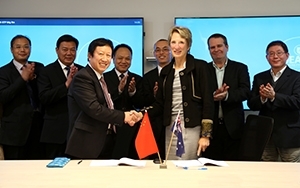Deakin electrospinning technology to take-off in China
Research news
A contract with Chinese textiles manufacturer, Dongwo Carpet Company, will lead to the commercialisation of Deakin’s electrospinning technology to mass produce a new generation of effective, comfortable and affordable nanofibre face masks for the global market.
With a projected production of 30 million face masks per annum initially, the technology is set to improve the quality of life of millions of Chinese, and, potentially, large populations in India and the Middle East.
Founded in Shandong Province in 2005, the innovative Dongwo Company focusses on R&D and manufacturing of geosynthetics and automotive interior materials design. The company has been exploring electrospinning technology with Deakin researchers over the past 12 months.
Deakin’s Deputy Vice-Chancellor (Research) Professor Lee Astheimer recently met with a delegation of six from Dongwo Company and the Laiwu city Government of Shandong province, who visited Waurn Ponds to see Deakin’s prototype, industrial scale electrospinning technology in operation.
The visit culminated in the signing of a $1.2 million contract that will see Deakin researchers, Professor Tong Lin, Research Fellow Dr Hongxia Wang and Dr Haitao Niu developing the polymer formulation and the design of a production line in China over the next two years.
Based within the Institute for Frontier Materials, the researchers have been fine-tuning the technology for the past six years, since they first patented the invention back in 2009, with the goal of taking electrospinning out of the research lab and into the commercial arena.
Electrospinning is based on the principle of using an electrical charge to create tiny fibres from a liquid. The Deakin researchers pushed this process to its limit to develop a unique coil system that enables the low cost, high yield production of nanofibre at the industrial scale.
The process also uses an environmentally friendly water-based material system, as opposed to solvent, which is most commonly used in current practice.
The unique properties of nanofibre – that stem from its high surface-to-volume ratio, permeability, light weight, strength and the breadth of materials from which it can be made – make nanofibre the best filtration material in the world, for collecting oil, dust or other pollutants.
According to Deakin’s Commercial Manager, Mr Lin Zhang, one of the main benefits of nanofibre face masks is that they are both comfortable to wear, due to high breathability, and provide effective protection from particles or droplets as small as Particulate Matter (PM) 2.5 microns.”
“This technology will improve the quality of life for people who have to wear face masks for pollution or other reasons,” he said.
“The Chinese Government is working hard to reduce pollution in the atmosphere, but for the next few years, millions of Chinese will have to wear face masks when the measured PM 2.5 reaches dangerous levels, likely many days of the year. Pollution problems are also growing in India and the Middle East.”
Dr Wang explained that the smaller particles are more dangerous because they can travel deep into the respiratory tract and lungs.
“2.5 microns in width is about 30 times smaller than a human hair,” she said.
“These particles can have short-term health effects, such as affecting people’s eyes or nose, as well as leading to asthma, chronic bronchitis, lung cancer or heart disease. The face mask can also protect wearers from viruses such as the flu, or more serious infectious diseases like SARS.”
Dr Wang added that the platform technology has many potential applications, including smart textiles, medical devices, defence clothing or use in super capacitors (fast charging power sources).
Share this story
 Front row: Mr Liu Chengmu, Chairman of Dongwo Co Ltd; Prof Lee Astheimer, Deputy Vice-Chancellor (Research);Back row: Mr Pan Yubin, Director of Laiwu Science & Technology Bureau; Mr Gao Yongsheng, Laiwu Laicheng District Governor; Prof Jian Xigao, Technical Consultant to Dongwo; Mr Lin Zhang, Commercial Manager; Mr David Pardoe, Senior Commercial Manager; and Professor Tong Lin.
Front row: Mr Liu Chengmu, Chairman of Dongwo Co Ltd; Prof Lee Astheimer, Deputy Vice-Chancellor (Research);Back row: Mr Pan Yubin, Director of Laiwu Science & Technology Bureau; Mr Gao Yongsheng, Laiwu Laicheng District Governor; Prof Jian Xigao, Technical Consultant to Dongwo; Mr Lin Zhang, Commercial Manager; Mr David Pardoe, Senior Commercial Manager; and Professor Tong Lin.
